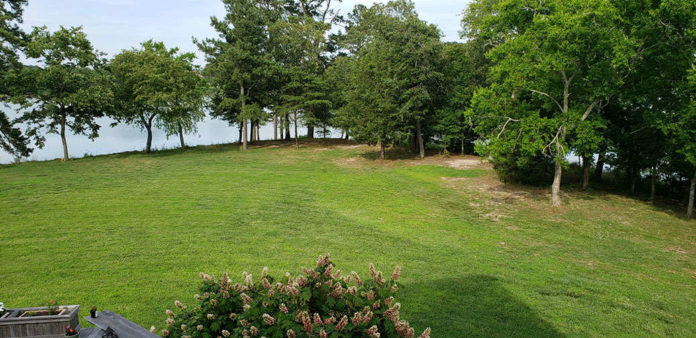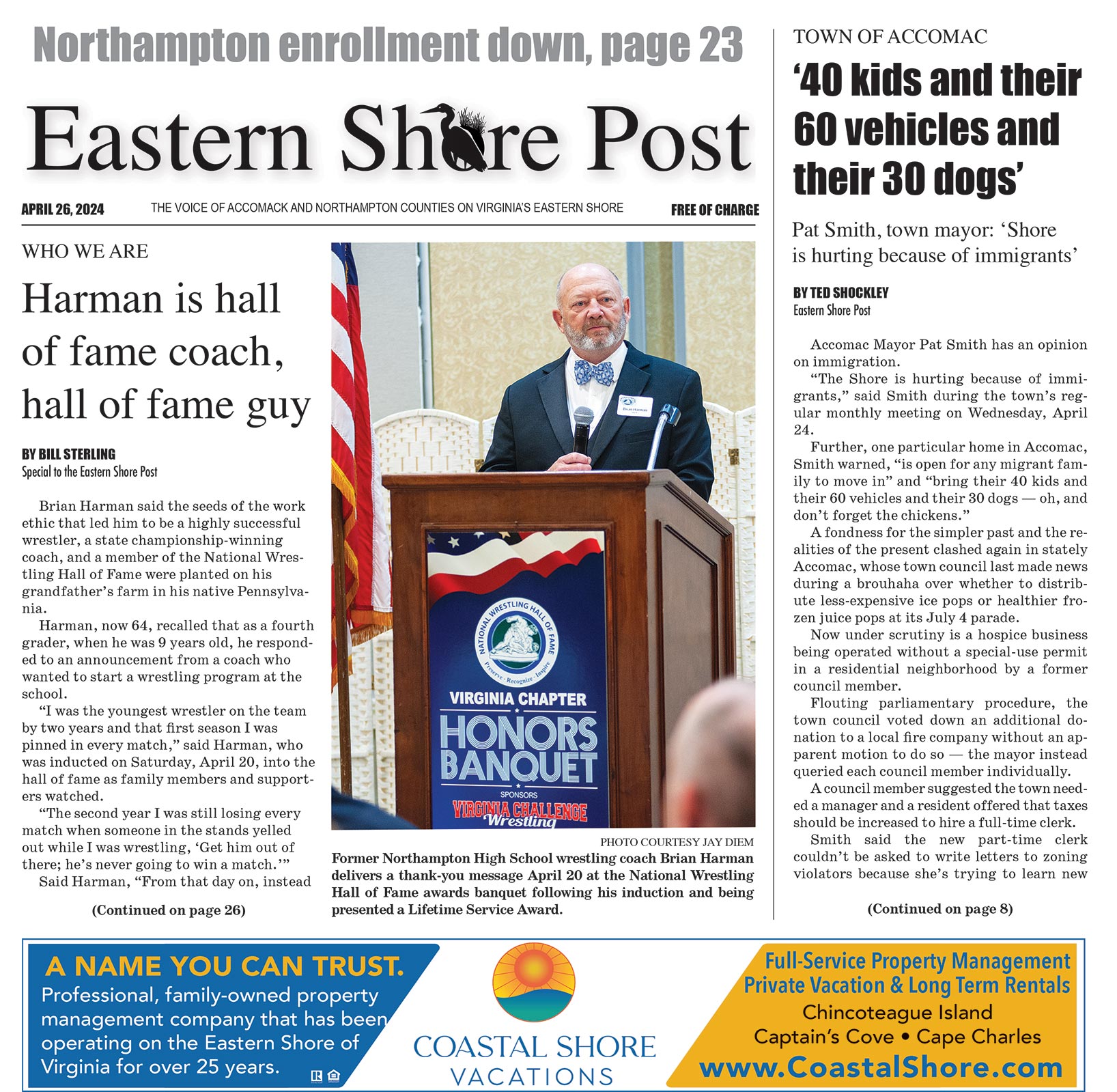
By Stefanie Jackson – Northampton County Board of Supervisors Chairman Spencer Murray threw one of the rules out the window Tuesday night at a public hearing on the event venue that John and Linda Cleaveland proposed for hosting weddings and other special events at their creekside home in Wellington Neck, a residential area of Franktown.
The chairman allowed members of the public all the time they needed to speak about the issue, beyond the usual three minutes per person. It was a decision he may have regretted when the speakers and audience became so loud and disorderly that he sprang from his seat, banged the gavel, and called them back to order.
But the one public comment that perhaps best summed up the opposition was neither loud nor disorderly. It came from Evelyn Witek, who commented on the nature of a typical wedding celebration as she approached the bench to hand Murray documents supporting her position.
“It’s a happy occasion, but not if it’s next door.”
The decision whether or not to grant the Cleavelands a major special-use permit (SUP) to use their agricultural-rural business zoned property as an event venue ultimately lay in the hands of county supervisors.
The Northampton planning commission had recommended denial of the SUP, and Supervisor John Coker agreed with their decision.
He read from section 154.2.082 of Northampton’s zoning ordinance, which states the purpose of an agricultural-rural business zone is to allow agricultural and agritourism activities.
Events are allowed that “are usual and customary at Virginia agricultural operations.”
“I don’t think weddings … rock concerts, and all that are customary Virginia agricultural operations,” Coker said.
He also read from section 2.2.2.1, letters “A” to “F” of Northampton’s comprehensive plan, which state land uses in rural, agricultural areas may include “traditional and innovative agricultural uses, and rural uses that complement and support farming.”
He stopped before letter “G,” which allows “non-agricultural low-impact uses that are complementary to agriculture and open-space preservation.”
Supervisor Dave Fauber, who was in favor of granting the SUP, said that statement is “the one that I hang my hat on.”
But Coker disagreed that an event venue is a “low impact” use of the land. It would be a high-impact use that would cause “neighborhood destruction,” he said.
He believed the event venue would pose a threat to public health, safety, and welfare, and he deemed Wellington Neck Road – on which guests would have to travel to reach the event venue – “treacherous.”
The secondary road is 14 feet wide – narrow enough to be considered a single-lane road – and it’s “turtle-backed,” meaning the road surface is higher than normal in the center.
A 2% downward slope on either side of a road’s center line is standard to allow stormwater drainage. Wellington Neck Road slopes about 8% on either side, said traffic engineer Betty Tustin, of Berlin, Md.
The Cree family, who share a driveway with the Cleavelands, had safety concerns about hundreds of vehicles accessing what they called a dirt road that becomes muddy and often impassable when it rains.
Many neighbors were concerned that loud music would be played until as late as 10 p.m., as permitted in Northampton’s existing ordinance.
About 50 neighbors had signed a petition stating their opposition to the proposed event venue.
Supervisor Robert Duer asked, “If one of these 57 homes became a short-term rental, what would they need to do? … How many guests can I have? … I could have a short-term rental and do anything I want to do. … I can have a rock band, right, as long as it’s not too loud?”
“If your point, Mr. Duer, is that on a short-term rental, you can have a whole lot of people over and raise a lot of hell, you got it,” Murray said.
Duer added that short-term rentals are permitted by right, “with no citizen comment whatsoever. That’s my point,” he said.
He indicated it would be difficult for him to say no to an event venue that would draw more business to the motels, restaurants, and other establishments in the district he represents, which includes the town of Exmore.
“Northampton County has eleven letters and we can’t get by the first two,” Duer lamented.
Coker pointed out that the comprehensive plan states, “new non-agriculturally based industrial and commercial uses” – like an event venue – “are discouraged in rural areas.”
Murray disagreed that the proposed event venue is a commercial use because “a commercial business operates 365 days a year,” but any special event hosted on the Cleaveland property will last one day, including the temporary use of portable equipment such as tents, signs, and outdoor toilets.
Neither did he believe that event venues should be permitted only in commercial zones, otherwise, “they’ll all be on Route 13 and we won’t have any weddings on the Eastern Shore,” he said. “If we don’t want event venues, then take them out!” he later asserted.
Coker asked if Murray had no consideration for the neighbors. “You know better than that, Mr. Coker,” Murray answered.
“No supervisor ever enjoys having to take a position on a crucial vote when the neighbors are at odds,” Murray said.
He added that he continually struggles to strike a balance between the rights of property owners and the rights of adjacent property owners.
“If in Northampton County, neighbors alone … can prevent the legal use of property by an owner, then none of our property rights are safe.”
Murray made an amended motion that supervisors approve the SUP with the following 11 conditions:
Events are permitted between May and October on weekends only.
No more than 15 events are allowed per year.
No more than 200 people are allowed per event.
No amplified music is allowed after 10 p.m.
No use of the dock on the property is permitted during an event.
All activities must occur outside the Chesapeake Bay Resource Protection Area (RPA).
Police must be present before, during, and after the event.
Noise must be buffered by vegetation or curtains.
Signs must be used to direct traffic to the event.
The airstrip on the property is limited to private use.
The permit will expire upon the sale of the property.
No condition was made regarding the Cleavelands’ shared, private driveway that Linda Cleaveland has said is not “dirt” but a sand and clay mixture, specially formulated to create a road that is more stable than one of sand or clay alone.
If a wedding at the Wellington Neck home turned into a “mud bath,” Murray said, “the Cleavelands are going to have a bigger problem with the bride and groom … and, frankly, given the world of social media, I doubt very seriously that they’ll ever have another one.”
Coker said he could not support Murray’s motion, because he believed the SUP should be rejected with no conditions.
Fauber seconded Murray’s motion, and it passed in a 3-2 vote. Supervisor Oliver Bennett, who wanted the number of events restricted to 10 per year, voted “no” with Coker.
Linda Cleaveland, who has said, “I love weddings,” had not expected her dream of hosting Eastern Shore weddings to come true. She was pleasantly surprised by the decision in her favor. Win or lose, “I put it in God’s hands,” she said.


